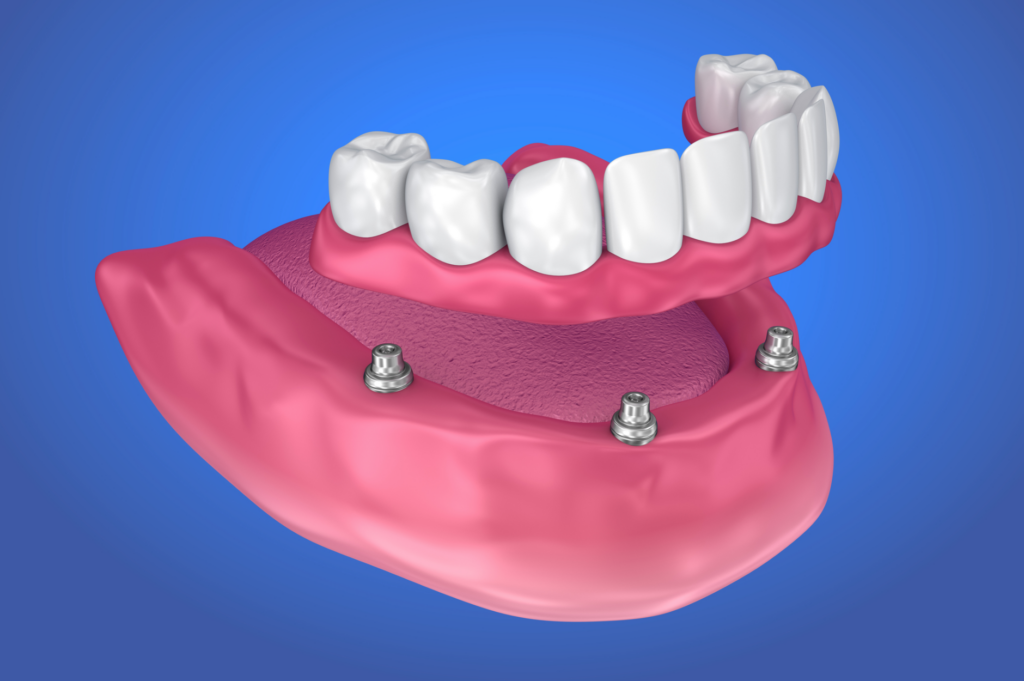
Are you missing most or all of your natural teeth?
If you are, you are probably aware of how it can affect your eating, speaking, and smiling, leading to further health complications.
Dental implants are a popular and effective solution for those with missing teeth, and the all-on-4 dental implant technology has revolutionized how we replace teeth.
This article will explore everything you need to know about All-on-4 dental implants, including what they are, how they work, and their benefits and drawbacks.
We’ll also cover the procedure, recovery, and aftercare and answer some common questions about All-on-4 dental implants.
What are All-on-4 dental implants?
All-on-4 dental implants, also known as full arch implant-supported dentures, are a dental restoration technique used to replace an entire arch of missing teeth in one or both jaws.
Unlike traditional dentures, which sit on the gums and rely on adhesives, All-on-4 dental implants are anchored in the jawbone using dental implants.
How do All-on-4 dental implants work?
All-on-4 dental implants use four dental implants placed strategically in the jawbone to support a full arch of replacement teeth.
The implants are made of titanium, a biocompatible material that fuses with the jawbone through a process called osseointegration.
Once the implants have fused with the jawbone, they provide a sturdy foundation for the replacement teeth.
Advantages of All-on-4 dental implants
- All-on-4 dental implants are a permanent solution for missing teeth, unlike traditional dentures, which must be replaced every 5-7 years.
- All-on-4 dental implants are more stable than traditional dentures, allowing for better chewing and speaking abilities.
- All-on-4 dental implants look more natural than traditional dentures, as they are custom-made to fit the patient’s mouth.
- All-on-4 dental implants can prevent further bone loss in the jaw, as they stimulate the jawbone like natural teeth.
Disadvantages of All-on-4 dental implants
- All-on-4 dental implants are a more expensive solution than traditional dentures.
- Placing All-on-4 dental implants requires surgery, which may not be suitable for all patients.
- All-on-4 dental implants may not be suitable for patients with severe bone loss in the jaw.
Candidacy for All-on-4 dental implants
To be a candidate for All-on-4 dental implants, patients must have sufficient jawbone density to support the implants.
Patients with severe bone loss in the jaw may require bone grafting before placing implants.
Other factors affecting candidacy include oral health, medical history, and lifestyle habits like smoking.
Procedure for All-on-4 dental implants
The All-on-4 dental implant procedure typically involves the following steps:
Consultation. The first step is to schedule a consultation with a qualified dental professional specializing in All-on-4 dental implants. During this consultation, the dentist will evaluate the patient’s oral health, discuss their medical history, and take any necessary X-rays or scans.
Treatment planning. After the consultation, the dentist will create a treatment plan tailored to the patient’s needs. This plan will include the number and placement of the implants and the design of the replacement teeth.
Implant placement. The next step is to place the dental implants into the jawbone. This is done under local anesthesia, and the dentist will use specialized tools to make small incisions in the gums and insert the implants.
Temporary teeth. After the implants are placed, temporary teeth are attached to the implants while the jawbone heals and fuses with the implants.
Final teeth. Once the jawbone has healed, the temporary teeth are replaced with the final set of replacement teeth. These teeth are custom-made to match the patient’s natural teeth and fit comfortably in their mouth.
Recovery from All-on-4 dental implants
After the All-on-4 dental implant procedure, patients may experience swelling, bruising, and discomfort.
The dentist may prescribe pain medication and antibiotics to help manage these symptoms. Patients should also stick to a soft diet for the first few weeks and avoid strenuous physical activity.
Aftercare for All-on-4 dental implants
To ensure the longevity of their All-on-4 dental implants, patients should practice good oral hygiene habits such as brushing twice a day, flossing daily, and using an antimicrobial mouthwash.
Patients should also attend regular dental checkups and cleanings to monitor the health of their implants and gums.
Comparison with traditional dental implants
All-on-4 dental implants differ from traditional dental implants in several ways.
Traditional dental implants are used to replace individual missing teeth, whereas All-on-4 dental implants are used to replace an entire arch of missing teeth.
Additionally, All-on-4 dental implants require fewer implants and can often be placed without bone grafting.
Comparison with dentures
All-on-4 dental implants offer several advantages over traditional dentures.
They are more stable, provide better chewing and speaking abilities, and do not require adhesives.
All-on-4 dental implants also prevent further bone loss in the jaw, whereas dentures can actually accelerate bone loss.
Cost of All-on-4 dental implants
The cost of All-on-4 dental implants varies depending on several factors, including the number of implants needed, the location of the dental practice, and the patient’s insurance coverage.
All-on-4 dental implants are more expensive than traditional dentures, but they are a more permanent and effective solution for missing teeth.
Maintenance of All-on-4 dental implants
To maintain the health of their All-on-4 dental implants, patients should attend regular dental checkups and cleanings, practice good oral hygiene habits, and avoid smoking or using tobacco products.
They should also avoid chewing on hard objects or eating sticky or hard foods that can damage the implants or replacement teeth.
FAQs
Are All-on-4 dental implants painful?
Patients may experience some discomfort after the procedure, but this can be managed with pain medication.
How long do All-on-4 dental implants last?
All-on-4 dental implants can last a lifetime with proper care and maintenance.
Can All-on-4 dental implants be used for both upper and lower arches?
All-on-4 dental implants can replace an entire arch of missing teeth in one or both jaws.
Can anyone get All-on-4 dental implants?
Only some people are candidates for All-on-4 dental implants. Patients must have enough jawbone density and a healthy mouth to support the implants.
How long does the All-on-4 dental implant procedure take?
The All-on-4 dental implant procedure can typically be completed in one day, but the patient will need to return for follow-up appointments to ensure proper healing and adjust the replacement teeth if necessary.
Conclusion
All-on-4 dental implants are a revolutionary solution for patients with missing teeth.
They offer a more permanent and effective solution than traditional dentures, and they can be used to replace an entire arch of missing teeth in one or both jaws.
While the procedure can be costly and only some are candidates, the benefits of All-on-4 dental implants make them a popular choice for patients looking to restore their smile and improve their oral health.
Schedule a consultation today and see if All-on-4 dental implants are right for you!
- Call us at 904-273-4373
- Email us at xrays@jaxdentalhealth.com
Darryl A. Field, DDS, is situated in Jacksonville Beach, FL, and welcomes patients from the surrounding areas.
